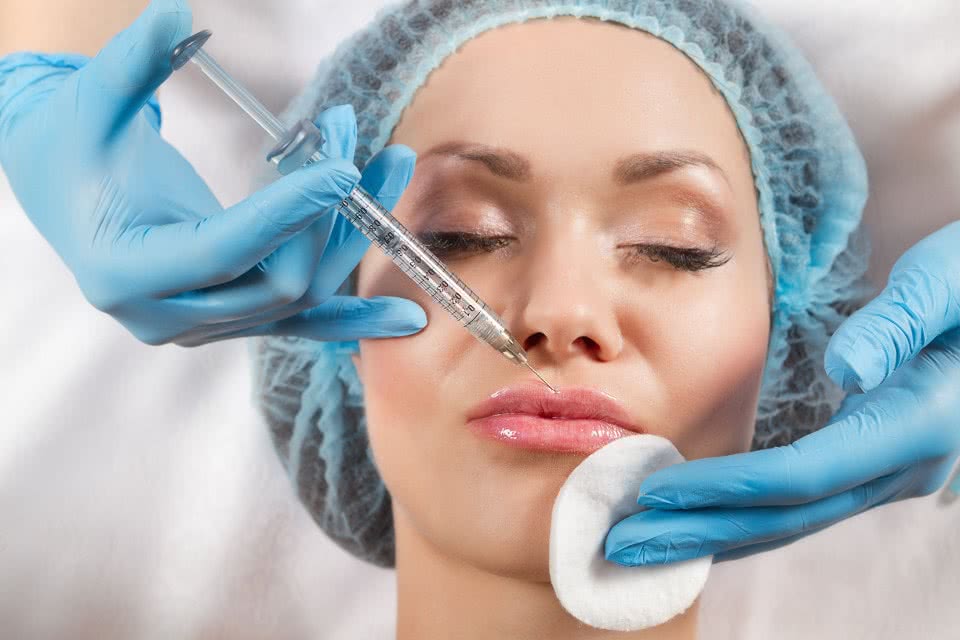Cosmetic Surgery of the Lips
Published on: 6 Nov 2017, 3:02 p.m.
Mr Debashis Ghosh
NHS Consultant
GMC Number: 4657664

Medically reviewed by a licensed NHS consultant
Last updated: 15/08/2019Get Free & Simple Pricing, Procedure & After Care Information from a Licensed Consultant Now
Photo Credit: Subbotina Anna/Shutterstock
Table of contents
Cosmetic surgery of the lips is, like its name suggests, a cosmetic procedure which is done to improve the appearance of the lips. Most people who decide for this type of cosmetic surgery want bigger and fuller lips (lip augmentation or lip enhancement). But it can also be done to reduce their size or change the shape, while the so-called lip lift improves their appearance by lifting the upper lift.
Why It’s Done?
Lip surgery is performed to improve the look of the lips by increasing or reducing their size, or using other type of modification with an aim to make them more beautiful and aesthetically pleasing. A number of procedures can be used to achieve the desired lip look, and they can be surgical or non-surgical, and permanent or temporary. Lip surgery can also be done in combination with other facial cosmetic procedures.
The Procedure
Both surgical and non-surgical cosmetic lip procedures are performed under local anesthesia. But the actual procedure, its duration, and both before and after care vary greatly from one procedure to another. For example, lip augmentation with filler injections lasts only a few minutes, while surgical procedures can last an hour or longer.
Some of the most common cosmetic lip procedures include:
Filler injections/fat transfer. Lip augmentation with filler injections involves injecting different filler materials in order to enhance lips that are thin. It’s a relatively quick and simple procedure but the results are only temporary. As a result, injections need to be repeated every few months to maintain the results. The most commonly used filler materials are collagen and hyaluronic acid gel.
Another option involving injections is the so-called fat transfer. Rather than injecting filler materials which can be natural or synthetic, fat transfer involves injecting the patient’s own fat. Therefore, there is no risk of allergic reactions. The results aren’t permanent either but they last much longer than fillers.

Photo Credit: Wallenrock/Shutterstock
Dermal grafts/lip implants. Both dermal grafts and lip implants provide permanent lip enhancement. Rather than being injected to the lips like filler materials, both dermal grafts and lip implants are inserted surgically. The main difference between the two is that dermal grafts are obtained from the patient’s own dermis (deep skin layers), while lip implants are made of various man-made and natural materials.
Vermilion advancement. Another surgical lip procedure that yields permanent results is usually done to treat lip disfigurement acquired at birth or by injury. However, it can also be used for lip enhancement by advancing the coloured lip portion. In addition to creating fuller lips, vermilion advancement can also be used to change/modify their shape.
Lip lift. This procedure is performed to lift the upper lip and by doing so, create a fuller and more youthful look of the lips. It typically involves making an incision in the nostrils or just below the nose line and pulling the skin upward.
Lip reduction. The goal of this cosmetic surgery is obviously to reduce the size of the lips. This is done by making incisions on the inside of the lip and removing a small portion of the tissue. Lip reduction can be performed on the upper or lower lip, or both.
The Results
Results of cosmetic lip procedures are either temporary or permanent, depending on which procedure you decide for. For example, while most filler injections last up to 6 months, fat injections or fat transfer can last for several years. The final results also depend greatly on the selected procedure and may take from several weeks to several months to be fully visible.
Photo Credit: LADO/Shutterstock
Side Effects and Possible Complications
Both surgical and non-surgical cosmetic lip procedures are extremely safe and complications are very uncommon. Nevertheless, it’s highly important to understand what is normal and what isn’t. Unfortunately, every procedure - no matter if it’s surgical or non-surgical - poses some risk of complications. These may include infection, allergic reactions, adverse reaction to anesthesia, scarring and tissue damage.
Depending on what procedure was used, you may experience some swelling, bruising, loss of sensation in the lips, redness and bleeding (from the sites of injections). But these are normal side effects and usually resolve within a few days.
Is Cosmetic Surgery of the Lips Right for You?
If you’re unhappy with your lips’ appearance either because they are too thin or too thick, or any other reason, cosmetic surgery of the lips can help you achieve the desired size and/or shape. Think about what you expect from the procedure, and talk to the surgeon about the options available including which is best for you based on the existing size/shape of your lips and your expectations from the procedure.
The Cost
Compared to other cosmetic procedures, those involving the lips are very accessible, especially temporary lip enhancements such as filler injections. The cost varies greatly from one clinic to another, with the prices starting at about £250-300 per syringe.
How many syringes you will need depends on how much fuller you want your lips to look. One syringe will add your lips an extra volume without altering their natural look. For more fullness, you will probably need two to up to three syringes which raises the cost to at least £500. Also, keep in mind that filler injections need to be repeated every few months in order to maintain the results. In total, you could thus be spending £1,000 or more a year.
There are also permanent solutions which, however, are considerably more expensive. How much more depends on the selected surgeon/clinic, the type of surgery and some other factors which will be explained to you during the consultation with the surgeon. You will also be told exactly how much your surgery is going to cost. Quotes start at about £2,000. This guide will give you advice on how to fund your lip surgery.
Finding a Surgeon for Cosmetic Surgery of the Lips
The easiest and most convenient way to look for a surgeon for cosmetic surgery of the lips is to browse the web. You will probably need to contact the surgeon/clinic for additional information including the price but they normally provide plenty of before and after photos to demonstrate the quality of their work, information about the procedures they perform, success rates, testimonials by former patients, etc. which can be very helpful when deciding whom to contact for consultation appointment.
It’s up to you to decide where to “have your lips done” but it’s a good idea to discuss your decision with your GP just to make sure there aren’t any health/medical reasons why you shouldn’t go through with the desired procedure. Also, your GP may help you find a surgeon or/and provide advice on things to consider when choosing a surgeon for cosmetic surgery of the lips.
Questions to Ask and Things to Pay Attention to When Choosing a Surgeon for Cosmetic Surgery of the Lips
The very first thing you should ask the surgeon is whether they are registered with the General Medical Council (GMC) to make sure that they are licensed to practise in the UK. Likewise, you are advised to check whether the clinic/hospital where the surgery is going to be performed is registered with the Care Quality Commission (CQC) or other relevant health regulator if the clinic/hospital is not in England.
When you make sure that the surgeon has all the necessary licenses to perform the desired procedure, you should ask for consultation appointment to meet them in person and discuss both your wishes and concerns. Ideally, you should make an appointment with several surgeons to be able to compare and contrast their results and approaches as well as responses to your questions which should, among other things, include the following:
1.Are you going to perform the procedure?
2.What qualifications do you have?
3.What’s your experience level?
4.Which procedure you recommend and why?
5. What other procedures are available and are they be worth considering as well?
6.What are your patient satisfaction levels?
7.Can I develop any complications during or after the procedure? If so, what are the possible complications?
8.Will you provide care/treatment if I develop any complications?
9.What happens if I’m not happy with the outcome?
10.Can you provide a quote and tell me what it includes?
In addition to being happy to answer any questions you may have, it’s also of key importance for the surgeon to ensure that you understand the procedure, what will be done and how your lips will look like after the procedure. They should also explain the risks and possible complications of the procedure as well as tell you exactly how much it is going to cost you including what’s included in the quoted price. If there are any additional charges, you should be made aware of them.
What if Something Goes Wrong?
The main purpose of having cosmetic surgery is to enhance one’s appearance but unfortunately, things don’t always work out as planned. While being extremely low, the risk of complications is there anyway. Same goes for the risk of unsatisfactory results. Therefore, it is of utmost importance to discuss the risk of both complications and unsatisfactory results with the surgeon during the initial consultation including what can be done in case something goes wrong.
If you developed complications or aren’t happy with the results of the procedure, contact the surgeon who performed the surgery and make an appointment to discuss further steps. They may offer you a revision procedure or/and financial compensation if they evaluate that they might be responsible for such an outcome. In the opposite case, they may ask you to pay for another procedure/treatment of complications.
You may also file a complaint to the General Medical Council (GMC) or/and report poor care to the Care Quality Commission (CQC). However, resort to this method only if you believe that the complication/unsatisfactory results are due to the medical negligence, surgical error or mistreatment and neither the surgeon who performed the procedure nor the hospital where the procedure was performed aren’t prepared to take any responsibility.
